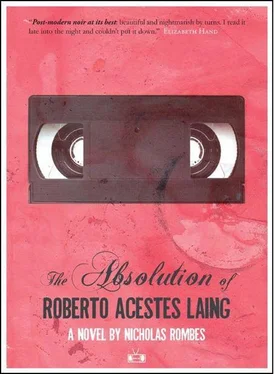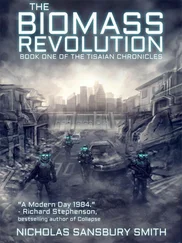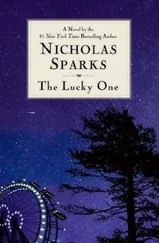What had happened here?
The same thing that had happened everywhere.
*
At 9 mile there’s a man, leaning against a splintering telephone pole, a russet duffel bag at his feet. His shoes are large and black. His hair is crow-black too, greased back like an old-time punk crooner, thinks Evie. An unsteady smile crosses his face as Evie approaches.
He extends his hand, his palm up. For a moment, Evie doesn’t know what to do. Instinctively, she reaches her hand out, too, and they shake, firmly. How long had it been since Evie had done such a simple, fundamental thing as shake another’s hand?
The sky above them has changed slowly from blue to purple, casting everything in a weirdly menacing violet light. The clouds appear distended, stretching low to the ground as if they carried something heavier than moisture. Without another word, they begin their journey, heading east along the city perimeter, skirting the motorway with its now-meaningless signs. As always when Evie’s mind begins to wander her thoughts find their way back to her sister Kate, who had gone missing over a decade ago, just out of university, and the letters she had received from her that she had begun to suspect weren’t really from her at all. Kate. Her shocking red hair. Her barrettes. Her missing left pinky from the accident. Her fierce, troublesome skepticism about the State.
Soon, Evie and Farris develop a rhythm to their walk, and over the course of that first day a set of unspoken rules takes shape: no small talk; walk not side-by-side but one in front of the other, switching positions when it seems right; eyes and ears open for whatever lays ahead. The most remarkable feature of the landscape is its relentless sameness, and if they hadn’t been paying close attention it might seem to Evie and Farris that they had passed the same locations several times, as if walking in a circle.
“I’ve never worked with anyone before,” says Farris, near the end of the first day.
“That’s okay. Who gave you the assignment? Who told you to wait for me at 9 mile?”
“Likely the same ones who told you to find me there,” says Farris.
“What did they say about me?”
“That your name was Evie, and that you would be coming. And that I was to trust you.”
Trust? Who could trust anyone anymore? Did Evie consider herself trustworthy? Or, put another way, did Evie trust Farris? At this point it didn’t matter; trust didn’t enter into the equation of what they were doing. Neither of them depended on each other yet. Each could complete the journey without the help of the other, although at the end everything could change.
They sleep that night beside the locks of an old canal, its stones carved with revolutionary slogans and the names of lovers. As she sometimes does before falling asleep, Evie makes a list in her mind of the things she can be certain of as a way, she supposes, to confirm that her sense of reality is not suspect. Her sister Kate; she is certain of her. And the man beside her, Farris; of him Evie is certain. The fact of the grass beneath her blanket, and the sound of the water in the canal, and the night insects she hears in the nearby trees, and the blank black sky without even a star, and the beating of her heart.
Of these things Evie is certain. This gives her comfort enough to fall asleep. In the morning, she will wake up, inexplicably, on the other side of the canal.
This is not a post-apocalyptic film, a film of what happens after the end of the world. The theorist in Evie understands this, about the story she’s in, understands that the end of the world is really a reactionary fantasy, the dream of thin-blooded tyrants, spun into popular narrative by writers and artists and movie makers. The landscape around her — the broken roads and disfigured buildings and polluted rivers — is not some dystopian fantasy of the slate-wiped-clean, but something far more dangerous: things as they are . The present is always the present, even when it seems like the future. There is no “post-” to what was happening to Evie.
As she lies there beside the canal, the light just beginning to come up on the horizon, she tries to work through yet again just why they had paired her up with Farris. And why, of all things, send them on a voyage to the outer remnants of the State to repair a well that was unnecessary, and had been for as long as anyone could remember? In school Evie had been taught by radical theorists that the well was, in the words of the philosopher D., an event , not a structure, an event that took the exterior form of a rupture and a redoubling . But she understood that the meaning of the well from a theorist’s point of view was just that: theory. She was a practical woman, and during those years of reading and puzzling over the most obscure, esoteric of texts, she made sure to keep grounded in the reality of this world — even as she read books and essays that dismantled that very reality — by chopping wood. She had lived for a time in a small rented house at the edge of a forest that bounded a field, and had taken to dragging fallen limbs out of the forest and hand-cutting and chopping them until her body trembled from exhaustion. As a way, she supposed, of connecting her back to the things her readings in theory were destroying.
But the well. No matter how it was theorized, it remained. And now she’s been summoned to repair it, the very structure identified by her teachers as the most visible outcropping of the ideological state apparatus. An event, not a structure . Something to be destroyed. And here she is, on her way to make it even stronger.
*
“This way, or that?” asks Farris.
They’ve reached yet another rusted, burnt-out patch of flattened meadow where the footpath forked in two directions, one easterly, one west.
“You pick.” She can’t be the one to decide. She doesn’t think it matters much which path they take.
“This way, then,” says Farris, and they head east, Evie walking behind, observing Farris’s slight limp. She also notices the scar on the back of Farris’s neck, a patch of almost shiny skin in the shape, as far as Evie can tell, of a five-pointed star.
An hour later, they arrive back at the same spot.
“Well, now what?” asks Farris, taking a swig from his canteen and passing it over to Evie. Something like a grasshopper but larger jumps across the space between them. For a moment Evie thinks it’s a bird but then just as quickly dismisses the thought. Birds don’t jump like that.
“West, then,” Farris says, wiping his mouth.
*
But west is no better. They pass several, then more, then more, people on the path, heading in the opposite direction, sacks of grain or something on their backs, babies strapped to their fronts like shrunken prisoners of war.
*
That night, lying in the dark, Evie cradles the small transistor radio to her ear, slowly rotating the tiny plastic dial through the Gaussian noise. The entire spectrum of the dial: nothing. Until at last, this, as if some terrible new philosophy was being communicated in a secret broadcast that Evie was not meant to hear.
Then, as if in response to the noise, she feels something on the back of her left hand, like the gentle movement of a moth turning in circles. When she’s sure Farris is asleep she holds the back of her hand up to the firelight and sees it there, the oil painting from her dream, in miniature, her sister Kate lost now but coming up for air in this painting, alive in oranges and reds on the back of her hand, tingling; and tilted just the right way against the jumping, shadowed light from the flames she could spot her, linseeded and moving in the painting and if she dared (which she did) to put the back of her hand to her ear she could hear her, the small bee-like voice, and in that moment Evie felt that she was in a loop, and that she had returned again not to a place but to a memory, the same memory, of her sister the night before she disappeared, purple barrettes in place, secret eye shadow, shorter-haired than before, focused, intensely focused, the car pulled over, the promise she made her make about keeping that drawer in her dresser locked, and the way she could tell in the car dome-light that something was wrong, and how it all changed with the sudden rain that forced them to roll up the car windows fast, the old hand-crank kind, and the pelting of the rain on the roof, and the steam rising off the hood, and then how it stopped suddenly and Evie had to kick open the door (she laughed) because the moisture made it stick, them coming around to the trunk area of the car, in the night, Kate calling her “brother” and Evie calling her “sister” as if they were the first to decipher the stupid codes of their time, the trunks of trees in the headlights of the car coming up from the earth, no record of them except in tree rings fossilized in museums or textbooks.
Читать дальше












![Nicholas Timmins - The Five Giants [New Edition] - A Biography of the Welfare State](/books/701739/nicholas-timmins-the-five-giants-new-edition-a-thumb.webp)